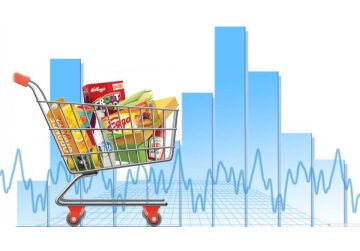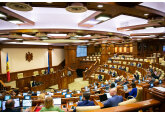
The military conflict in Ukraine, the regional geopolitical crisis, trade relations with Turkey and vulnerability of prices for fruits and vegetables may lead to higher inflation.
The National Bank's Inflation Outlook, published on May 15, contains a list of risks that could have inflationary or deflationary pressures, also becoming a factor of uncertain impact on the inflation forecast. National Bank experts believe that the ongoing war in Ukraine makes it difficult to prevent possible shocks, and Moldova's proximity to the armed conflict reduces investment and affects price formation, so the regional economic and geopolitical crisis has inflationary pressure. Also, the military conflict creates additional price risks for goods sold on the domestic market. Thus, replacement of some goods from Ukraine with similar products from other countries, as well as additional demand for goods from Ukraine create additional inflationary pressure. Economic agents are forced to use alternative routes, bypassing Ukraine for export/import of goods, and look for new suppliers, which increases the costs of transportation of goods and provokes an increase in inflation. The same impact, or at least a factor of uncertainty, is foreign trade with Turkey. After the earthquake of February 6, Turkey imposed restrictions on the export of fruits and vegetables, which will affect the value of these products before the start of the agricultural season in Moldova. At the same time, imports of industrial and agricultural products from Turkey may decrease, which will affect the prices. As expected, the presidential elections in Turkey will determine the future of the Turkish lira and the country's position on the grain agreement in the Black Sea. As for local agricultural products, prices are affected by unfavorable weather factors (frost, excessive precipitation), as well as the costs of harvesting, transportation, storage and sale of products. In case of lower temperatures or abundant precipitation, the prices of agricultural products will be higher than forecasted by the National Bank for the coming months. For example, abundant precipitation and lower-than-normal air temperatures in the first half of April affected the development process of some crops, in particular flowering fruit trees, as well as hindered the sowing of spring field crops). This may lead to higher prices for some categories of fruits and vegetables. The ratio of the nominal and real effective exchange rate of the MDL (Neer/Reer) may also affect the growth of the average annual inflation forecast. The strengthening of the national currency is a stimulating factor for imports and can affect the indicators of net exports to Moldova. But in combination with the recent increase in prices of goods and services on the international market, the trade deficit will continue to be negative, affecting the depreciation of the MDL. As for deflationary factors, one of them may be the reduction of natural gas prices in the region, which started since late last year - this creates prerequisites for lower gas and heating tariffs for consumers. However, given the possible availability of reserves of purchased gas at higher prices, as well as existing financial deviations accumulated for previous periods, the reduction in tariffs may occur a little later. The timing and size of the gas tariff adjustment is unknown. Deflationary pressure may have a decrease in the number of refugees in Moldova. Today they directly contribute to an increase in consumer demand from the population, and their return to Ukraine or other regions will lead to a decrease in domestic demand. Another deflationary factor mentioned by the National Bank is the slow spread of monetary policy changes on the rates on newly issued loans in MDL. This leads to the fact that economic agents and households are delaying decisions to obtain loans. The National Bank notes that the main transmission channels of monetary policy (interest rates, credits) function with difficulties, which increases the time of impact of monetary policy measures on the national economy. // 16.05.2023 - InfoMarket.







